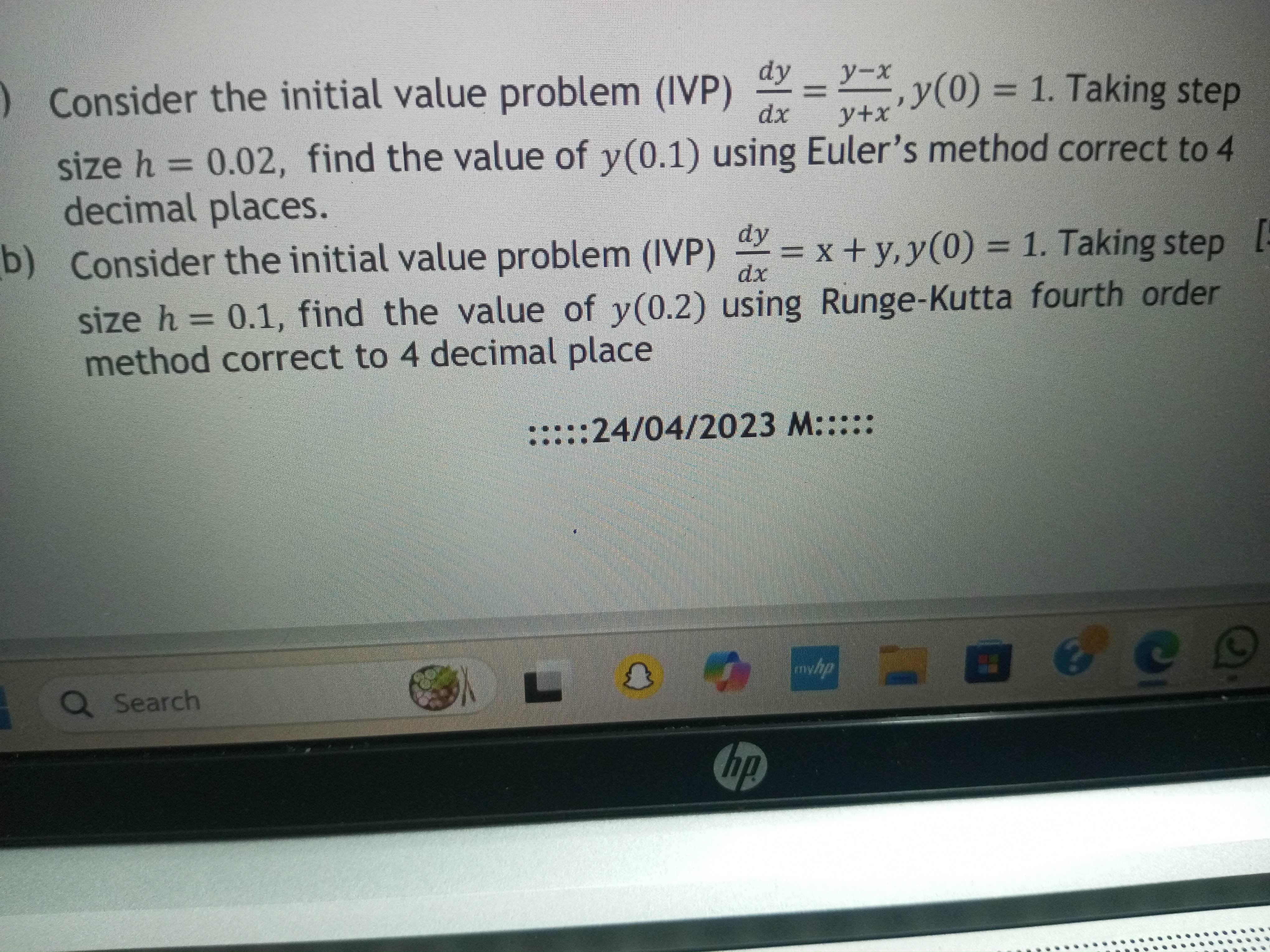Consider the initial value problem (IVP) dy/dx = (y - x)/(y + x), y(0) = 1. Taking step size h = 0.02, find the value of y(0.1) using Euler’s method correct to 4 decimal places. Co... Consider the initial value problem (IVP) dy/dx = (y - x)/(y + x), y(0) = 1. Taking step size h = 0.02, find the value of y(0.1) using Euler’s method correct to 4 decimal places. Consider the initial value problem (IVP) dy/dx = x + y, y(0) = 1. Taking step size h = 0.1, find the value of y(0.2) using Runge-Kutta fourth order method correct to 4 decimal place.

Understand the Problem
The question presents two initial value problems that require numerical solutions using specific methods (Euler's method and the Runge-Kutta method). The questions involve calculating the values of y at given points with a specified step size, ensuring the answers are correct to four decimal places.
Answer
For the first IVP: $y(0.1) \approx 1.0202$, for the second IVP: $y(0.2) \approx 1.2214$.
Answer for screen readers
-
For the first IVP using Euler's method, $y(0.1) \approx 1.0202$.
-
For the second IVP using the Runge-Kutta method, $y(0.2) \approx 1.2214$.
Steps to Solve
-
Define the Function for the First IVP The given initial value problem is $\frac{dy}{dx} = \frac{y - x}{y + x}$ with the initial condition $y(0) = 1$.
-
Apply Euler's Method Using the formula for Euler's method: $$ y_{n+1} = y_n + h f(x_n, y_n) $$ where $f(x, y) = \frac{y - x}{y + x}$, $h = 0.02$, $x_0 = 0$, and $y_0 = 1$.
Calculate values step by step until $x = 0.1$.
- Iteration for Euler’s Method
- Calculate $f(x_0, y_0)$: $$ f(0, 1) = \frac{1 - 0}{1 + 0} = 1 $$
- Update using Euler's: $$ y_1 = y_0 + 0.02 \cdot 1 = 1 + 0.02 = 1.02 $$ -Repeat for $x_1 = 0.02$, $x_2 = 0.04$, ..., until $x_5 = 0.1$.
-
Define the Function for the Second IVP The new IVP is $\frac{dy}{dx} = x + y$ with initial condition $y(0) = 1$.
-
Apply the Runge-Kutta Method For the Runge-Kutta fourth-order method, the formulas are: $$ k_1 = h f(x_n, y_n), $$ $$ k_2 = h f(x_n + \frac{h}{2}, y_n + \frac{k_1}{2}), $$ $$ k_3 = h f(x_n + \frac{h}{2}, y_n + \frac{k_2}{2}), $$ $$ k_4 = h f(x_n + h, y_n + k_3), $$ $$ y_{n+1} = y_n + \frac{1}{6}(k_1 + 2k_2 + 2k_3 + k_4) $$ with $h = 0.1$.
-
Iteration for Runge-Kutta Method
-
Calculate for $x_0 = 0$ and $y_0 = 1$.
-
Compute $k_1$, $k_2$, $k_3$, and $k_4$ for the first step and then find $y(0.2)$.
-
For the first IVP using Euler's method, $y(0.1) \approx 1.0202$.
-
For the second IVP using the Runge-Kutta method, $y(0.2) \approx 1.2214$.
More Information
Euler's method is a straightforward numerical method for solving ordinary differential equations, while the Runge-Kutta method provides a more accurate solution by considering intermediate values. The choice of step size significantly affects the accuracy of the approximation.
Tips
- Failing to correctly apply the iterative formula in Euler's method can lead to incorrect estimates.
- Confusing the $h$ value when transitioning between different methods can result in discrepancies.
- Not rounding correctly to four decimal places after calculations may cause a lack of precision.
AI-generated content may contain errors. Please verify critical information